Interview with Jennifer Wester, an eternal skating artist
Jennifer Wester is a former ice dance champion. Let's see together through this interview, how she managed to bring figure skating to the status of a work of art, thanks to her PicSkates !
Interview
Hello Jennifer, can you introduce yourself? Tell us about your career as a skater and an artist?
Hi. I’m Jennifer Wester. I’m from Dallas, Texas. I was a professional figure skater for many years, specifically in the ice dance discipline. I was fortunate enough to be on TeamUSA from 2005-2010 and competed in the Four Continents Championships, the Grand Prix of Figure Skating, and other international events. The highlight of my competitive career was in 2008 when my skating partner and I placed 4th at the Four Continents Championship in South Korea.
Following my competitive career, I skated professionally for many years including in televised shows such as Skating with the Stars (ABC, 2010) and in Notti Sul Ghiaccio (Rai1, 2015). At the close of my competitive skating career I decided to return to academics, attending Yale and graduating with a Bachelors of Art in Computing and the Arts. Following the completion of that degree in 2015, I began showing in solo and group art shows and honing in on what my work as an artist would be. As of the fall of 2019 I was awarded a Meadows Award to achieve my Masters of Fine Art at SMU, which I am currently working toward.
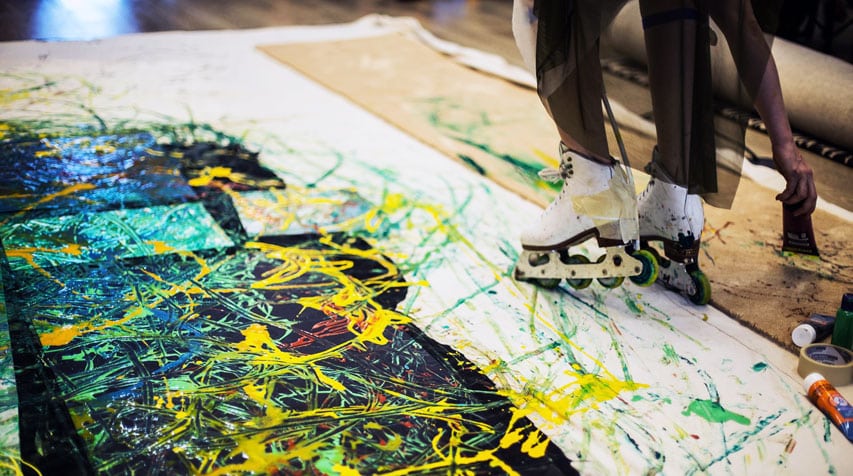
What led you to paint with your artistic inline skates?
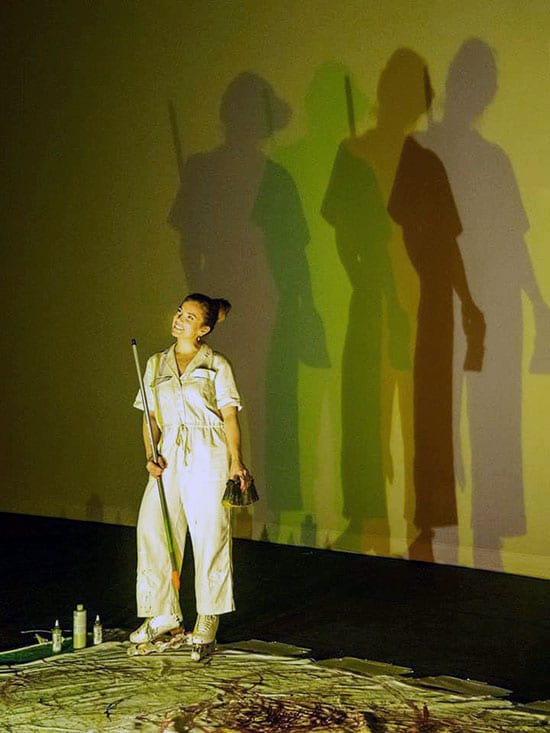
I began skating with artistic roller skates after deciding to think about the visual art of figure tracings. After many experiments, it was becoming increasingly obvious to me that there was little to no way to capture tracings from the ice surface so I was looking for a device and method of skating tracings that would leave a permanent record of my movement through space rather than a temporal one.
Is it your job or a passion?
I’m happy to say, both! I am a working artist AND I’m quite passionate about creating art (I’m not sure if it’s wise to be an artist if you’re not).
How do you do that?
How do I work in my passion? Or how do I skate to paint? As for how do I work in my passion, it’s about making sure I protect the passion part of the work and don’t turn everything into a money making proposition. I find that my goals had to be reprioritized away from the typical indoctrination of american culture to chase the dollar. Instead I had to set expectations for the lifestyle I wanted, being really honest with myself about what I wanted, not what I felt like I needed to show or be or have for anyone else’s approval. This allowed me to realize time and space for the passion where I don’t calculate any profit or loss — its about making life decisions.
Do you skate in music?
Sometimes I skate to music. Sometimes I seek to make music from my skating. What I mean by that is, I listen really intently to the sounds that I’m making with each move or step and try to carry rhythms or tempos with those sounds.
Do you skate in front of an audience, like a performance?
Sometimes I skate in front of audiences creating performance paintings. Other times I work on pieces in my studio and people only really see the final piece.
How long do you take to paint your productions? What sizes do they average?
The paintings that I do in my studio normally take many weeks to complete because I need to let layers dry and build up the surface with ‘practice’ skates of the tracings I’m trying to achieve in the paint. Performance paintings on the other hand can be rather fast, perhaps a couple of hours or a day in total. Either way the pieces tend to be rather large. The smallest regular canvas I have found myself producing is a 40″x65″ rectangle.
Do you think it’s easier to produce an abstract work than a figurative one?
I think it is equally difficult because abstract work doesn’t have a goal already existent to compare to in knowing when it’s completely doing what you want it to do. In this way it can be really difficult to develop work abstractly and feel like you’re making progress rather than just more stuff. I always want to be working toward more effective work so understanding how abstract work improves has been a really challenging process. On the flip side, figurative work has certain standards that can be applied, such as academic realism, hyper-realism, and other styles that describe how photographic the work needs to be in order to technically be good. Abstract work doesn’t have that kind of structure which can at times be really tough.
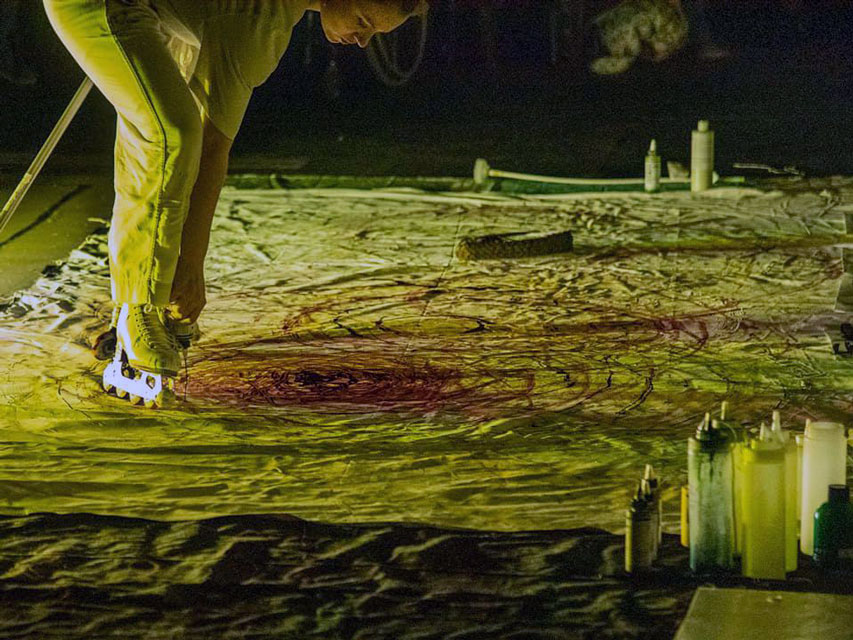
Is it physically hard?
It’s not as physically hard as some of the other work I’ve done. For instance one of my performance pieces, Breaking Shadows, takes a lot of training because I skate with ice skates on my hands and feet over a synthetic ice surface. The choreography needed to work with all of my limbs on a plastic surface balanced on blades is physically very difficult. Skating on paint really just requires concentration, otherwise my body is already trained to perform the movements so it’s not exceedingly taxing.
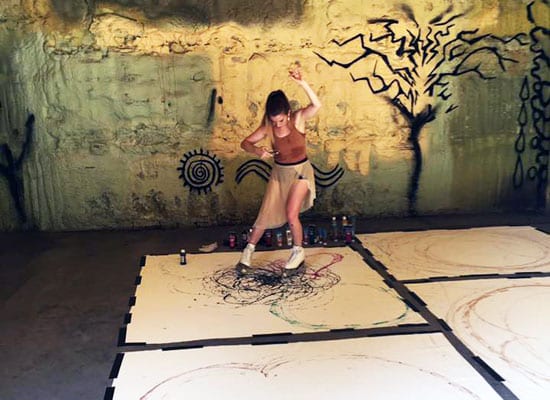
Do you use specific wheels? How do you clean your skates?
I use the wheels that came with my skates but I have dremelled out a groove in some wheels to reduce their surface area such as I am used to in figure skating and so as to make different quality lines in the paint. I clean my skates with an all natural biodegradable paint cleanser. I also don’t worry about cleaning off the paint from my boots, just the wheels. So my boots are kind of splatter painted at this point.
Is your pair of skates reserved only for painting?
Yes and no; I have definitely skated down the sidewalks with them but for the most part they end up in my studio when I’m painting and dont have them with me at other times to use around town.
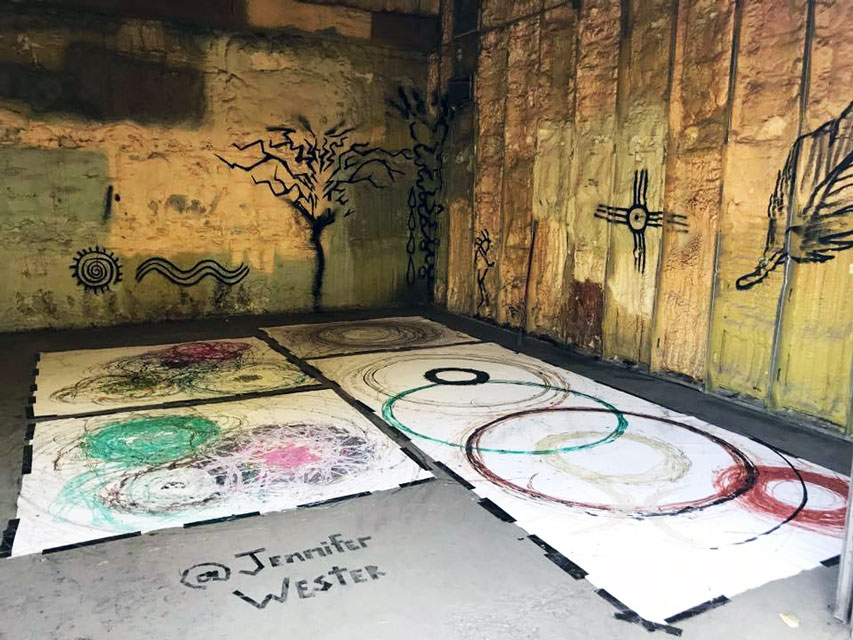
Are you a famous artist? If so, how much is the price of your works?
I don’t know what the line of ‘fame’ is in the art world. I have developed a small following and have been lucky to see a few successes already. The prices for my painting pieces vary but are between $1000 and $2500 at the present time.
Do you continue to skate on ice or roller-skating inline (Pic Skates)?
I sometimes skate on ice for fun or go with my kids to the park and roller skate. I am no longer competing or professionally performing as a skater — I have reserved my performances to the identity of an artist in that way.
Do you have any other artistic practices with inline skates?
I don’t currently have any other expressions with the inline skates — it takes a lot of work to paint and perform paintings with them.
Free speech: You can say what you want!
I don’t know what to say! I am very thankful that you have reached out to me and I’ve been inspired by the videos or artistic roller-skating that I’ve found online while transitioning from ice to wheels. Thank you for your patience in my slow response rate as well — the art schedule has been exceedingly busy lately and it’s been all I can do to get new projects on deck. I hope you’re readers are having a beautiful day and that my work can somehow inspire others interested in exploring their own creative ideas in skating.
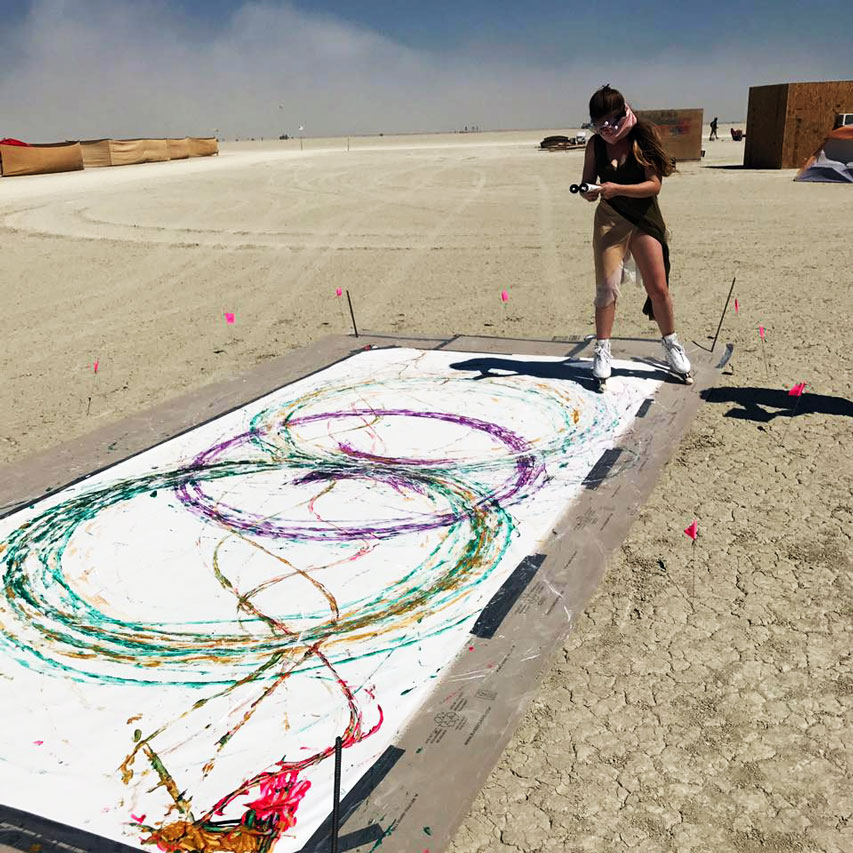
Liens utiles
Facebook – Jennifer Wester
Instagram – jenniferwester
Website jenniferwester.art
